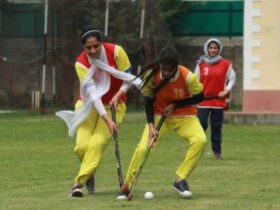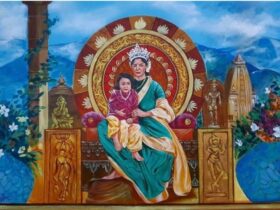M.Kaiser
Since times immemorial art & crafts have charmed mankind and have helped civilizations to preserve and inherit their cultural symbols. Kashmiri Handicrafts holds a rich history of craftsmanship and the residents of this blessed valley have skillfully nurtured their cultural heritage. The legendary ruler of Kashmir Sultan Zain-ul-Abidin, famous as Budshah (Great King), had a big contribution in the field of arts and crafts. According to historians, Budshah invited a large number of competent teachers and craftsmen from Samarqand to train people here in these arts. Some of the handicrafts introduced include carpet weaving, papiermache, silk, paper making etc. Kashmiri artisans improved and perfected these arts to such a level that their fame spread to whole Asia and even to Europe.
Pandit Anand Koul, a noted writer giving an account of the development of these crafts writes, “Zain-ul-Abidin turned Kashmir into a smiling garden of industry inculcating in the hearts of the people sane conceptions of labour and life and also implanting in their minds the germs of real progress.
He introduced correct measures and weights and made artisans and traders take solemn oaths (which in those halcyon days one could not easily break) not to kill their golden goose by cheating and swindling. He thus promoted commercial morality and integrity and industrial righteousness-qualities which constitute the backbone of a people’s credit and reputation. It was through these virtues that the Kashmiris successfully carried on shawl and other trades at a period when Kashmir was an isolated country and communications with outside world were very difficult.”
The spirit of the Great King must be immensely hurt by the happenings in present day Kashmir. Almost all the attributes which Pandit Anand Koul attaches to the traders in the period of Budshah are missing today. Just for an unquenchable material greed. Today, we see number of craft businessmen violating the decades old ethical trade practice of Kashmir by selling fake, unlabeled Kashmir handicrafts in the name of genuine Kashmir handicrafts.
Selling of Fake craft products on the name of genuine Kashmir Handicraft has marred the cottage industry of valley to a large extent. These fake products are manufactured in industries outside state and therefore had a large adverse impact on our economy. Handicrafts items fetch good foreign exchange revenue to the Jammu and Kashmir and over five lakh persons are engaged in handicrafts and handloom sectors the state. The issue of fake craft products has been taken seriously by the government and few solutions to this problem have also been proposed.
Geographical Indication (GI) registration is an important measure for restoring genuineness of a product. GI identifies a product as originating from a particular place. According to the Geographical Indication of Goods Act (Registration and Protection) 1999, it means that “a given quality, reputation or other characteristics of such goods is essentially attributable to its geographical region.”
One of the reasons the GI Act came into effect in 2003 was the serious threat that fake handicrafts and handlooms posed to the livelihood of thousands of artisans. Mass-produced fake Pashmina shawls, Kashmiri carpets and even craft of other states like Ganesha idols were flooding the Indian market from both within and outside the country. Imitation products were also being sold abroad. Fake Banarasi-sarees, were being sold in India. This severely impacted the artisans. Looms were deserted because of acute poverty and diminishing demand and many artisans committed suicide.
GI registration of handicrafts has already helped many states. Tamil Nadu has the third largest number of registered GIs for handicrafts and handlooms after Karnataka and Andhra Pradesh. Need is to bring more Kashmiri crafts under GI. Once GI registration is received for all major handicraft products, it will help to build up “brand Kashmir” of handicrafts across globe.
Another measure to stop the sale of fake Kashmiri shawls is to use radio frequency identification tag (RFIT). The state government has proposed that World famous Kashmiri shawls will be tagged through RFIT which will be a great step forward to stop sale of fake Kashmiri shawls. In this regard, a testing laboratory has been build for world famous Pashmina shawls in Nowshera Srinagar.
Apart from above measures, the state government is making all out efforts to check the sale of fake handicraft items, including Pashmina shawls and carpets. For this purpose, the handicraft department deputes quality control Inspectors and Supervisors to various places where the department conducts craft bazar, exhibitions, within and outside the state to monitor the quality of handicraft goods.
Despite, steps taken by the state government to check the selling of fake Kashmiri handicrafts, the craft industry in general and craftsmen in particular continue to suffer due to this ill-trade practice.
















Leave a Reply